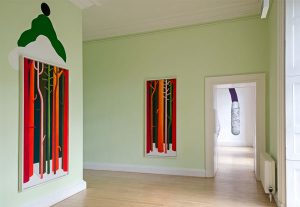Tropical Botanist, James Richardson, has responded to the exhibition Nicolas Party, Boys and Pastel, in the first of a new series of engagement between the contemporary art exhibitions at Inverleith House and the botanical research staff working within the Royal Botanic Garden Edinburgh.
Oh strange beautiful grass of green
With your majestic silken scenes
Your mysterious mountains
I wish to see closer
The fascination with discovering life on other planets is understandable, yet we are unlikely to find anywhere or anything quite like the planet we inhabit. On this planet one and a half billion years ago a eukaryotic cell engulfed a photosynthesizing cyanobacterium that led to the evolution of all plant life on earth. One and a half billion years of evolution that gave us the enormous range of forms that have shaped the environments that we inhabit today. The Royal Botanic Garden is privileged to study these forms and the processes that produced them. From the rain forests of the Congo to the ecosystems of the high Andes we are there to explore, explain and conserve the species and ecosystems on which we depend. Some 7000 species of plants have been utilized by humans as food throughout the course of our history. One quarter of the medicines we use come directly from or are derivatives of plants. The maintenance of the diversity of those species is also dependent on the others that inhabit the same ecosystems. Those ecosystems provide us with essential services – regulating air quality and climate, harbouring water. There is so much still to uncover, basic knowledge on species that might be of huge benefit to mankind. We are never likely to fully understand single individuals, single species or single ecosystems and precisely how organisms interact. This knowledge will always be tantalizingly out of reach. Our job as scientists in this field is almost one of an interpretation of this greatest work of art. As a species we have the capacity to try to understand and interpret both through pure science and art. Any work that stimulates consideration of the living things that inhabit our surroundings is of immense value.
With the power of self-determination we are the custodians directing from a pulpit, channelling and exploiting for our own needs. Short term economic gains means we are focused on a small percentage of the diversity of a small percentage of those species of which some believe we can depend. Thinning out, discarding by accident or design, those that we consider unnecessary. There are warnings everywhere and often it is the plants that are telling us, indicating the air quality of our cities, disappearing as our climate warms and dries. A scorched earth, Mars. Untold riches lost.
James Richardson, 2015
Thank you to James for his valuable response and collaboration with Inverleith House.


